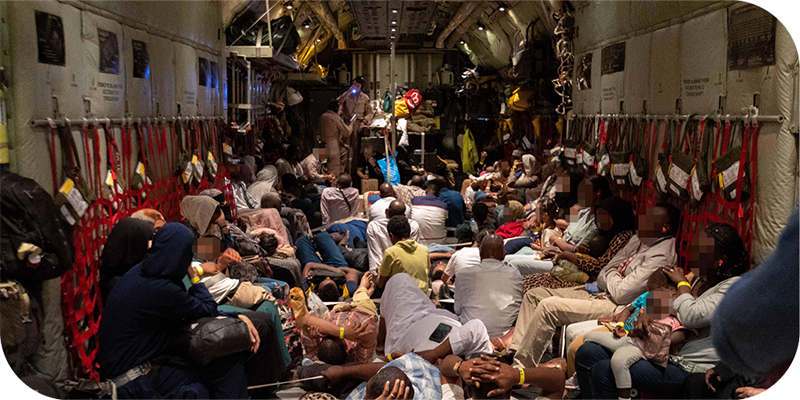
When the armed conflict in Sudan broke out in April of 2023, many thousands were forced to flee, including Australians and their families. Assisted departure flights provided by both Australia and some of its consular partner countries were able to use Cyprus as a base to fly to and from Sudan.
The team at the Australian High Commission in Nicosia, Cyprus swung into action to support these operations, playing a key role in Australia's crisis response and helping to assist the departure of Australians and their families to safety.
For Christos, one of the team members in the Australian High Commission in Cyprus, being part of the crisis response team gave him the opportunity to help people in their time of dire need.
"Emotionally, it was saddening to see thousands of people fleeing to save their lives," Christos said.
"Some were on vacation, having an enjoyable time. Some were visiting family, attending a wedding, or there to study, but instead, they had to go through this ordeal.
"Those who lived there had to leave behind their homes and belongings, travelling with just a bag. I was happy to be able to help them."
Team members worked around the clock out of the Cyprus Joint Rescue Coordination Centre. Christos' role focused on supporting the High Commissioner and the rest of the Australian team and coordinating assistance to help people get back to Australia.
"People were transported from Sudan to the Cyprus Army Training Camp, which served as temporary accommodation, and we gave them a meal and drink on arrival. We took care to look after children, the elderly and people with special needs," Christos said.
"I booked their flights back to Australia and helped them get to the airport. We did many things to assist, such as special packing for damaged bags, assistance for people with mobility issues, and liaising with airline staff and authorities."
The urgency of departure from the conflict zone meant many people arrived in Cyprus without cash, travel documentation, and minimal baggage.
"Some had expired or damaged passports or visas, while others had completely lost their paperwork. They could still be assisted to depart, but these challenges caused delays along the way," Christos said.
"Part of my role was to arrange traveller emergency loans, as some people had left in such a rush they had no money on them.
The Nicosia Post team worked hard to help Australians, working with Border Control officers on passport and visa issues and with the Australian Defence Force.
"Many people needed emotional support, as well as our assistance to help them contact their families," Christos said.
"A lot of issues arose, and we worked hard to help resolve those issues for people.
Christos, born and raised in Cyprus, has worked at the Australian High Commission in Nicosia for 15 years, and his usual day job includes managing finance, human resources, property and IT. It's a problem-solving role that enables him to adapt quickly to the variety of situations the high commission comes across in its usual business.
While Christos was supporting those who fled Sudan, he was also responsible for supporting the other crisis response team members from the High Commission.
"Throughout all this, I arranged meals and accommodation for my team, as well as practical help in the form of phone chargers, SIM cards and power adaptors," he said.
"The High Commissioner gave us the freedom to tackle the situation as best we could, using our initiative to defuse difficult situations and providing good service to Australian citizens," Christos said.
"It was beneficial to have the support of the Australian Border Force officers on location, who assisted with passport and visa issues. These additional resources and their experience and overall positive attitude were crucial to successfully assisting the departure and onwards travel of Australians at a time of distress."
The crisis response included 10 days of 24/7 support and coordination from the team in Cyprus to get the Australians to safety.
"It was a very intense period for our Nicosia team," Christos said.
"Physically, those 10 days were very exhausting. Being away from my family for such long hours was difficult, but I had their support and understanding.
"I received thanks and appreciation from the people we helped.
"We often ignore what is happening in other countries," Christos said.
"This was a wake-up call. There are people around the world who are not as fortunate as us. We should be welcoming opportunities to offer a helping hand."

Image credit: Department of Defence
DFAT crisis hub
For more on the Australian Government’s response to the Sudan conflict, visit www.dfat.gov.au/crisis-hub/sudan-conflict
Australians in need of emergency consular assistance should contact the Australian Government's 24-hour Consular Emergency Centre on 1300 555 135 (within Australia) and +61 2 6261 3305 (from overseas).
